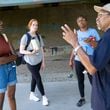People in Atlanta are voting with their feet. Walking is now recognized as essential to health and a catalyst for economic development. It also connects people and is the cornerstone of a thriving, livable city.
Despite that, many people who walk are tripping or falling on broken or uneven sidewalks. That’s not surprising, since Atlanta officials estimate that one fourth of the sidewalks here need to be repaired or replaced.
In 2010, the Public Works Department estimated the cost of repairing broken sidewalks at $152 million. Five years have passed, so $200 million may be more accurate.
For years, Public Works blamed lack of funding for the poor condition of Atlanta’s sidewalks. During the past year, however, Atlanta took important steps forward.
In February, Atlanta created a Public Improvement and Infrastructure Account. Phased in during the next five years, Atlanta will allocate 3.5 percent of the City’s general fund budget each year to this account. By 2020, this is likely to come to over $20 million.
Terrific improvement, with one catch – the money can be used to repair roads and bridges as well as sidewalks. Public Works Commissioner Richard Mendoza estimates the cost of annual sidewalk disintegration at $15 million. Given that, it’s unlikely the new infrastructure account will provide enough to keep up with annual sidewalk decay, let alone address the backlog of broken sidewalks.
In March, voters approved infrastructure bonds that enable Atlanta to invest $188 million to repair bridges, roads, traffic signals and sidewalks. I applaud Atlanta officials and voters for recognizing the importance of routine infrastructure maintenance.
Sidewalks, however, got the short end of the stick. Through the end of 2014, the project list allocated $40 million to sidewalk repairs and $35 million to install or repair curb ramps. But not long thereafter, the money for sidewalk repairs vanished – and the money for curb ramps dropped to $5 million.
People who participated in Town Hall meetings or made online comments expressed strong support for funding sidewalk repairs. Despite that, city officials pulled the rug out from under our feet.
The Public Works Department now estimates that bonds will enable it to invest $16.3 million in sidewalks and curb ramps. If a street is resurfaced, sidewalks – if they exist on it and are broken – will be repaired as well. Likewise for locations where traffic signals or bridges are repaired.
That’s better than nothing, but still quite discouraging. Many of these projects are not aligned with where sidewalks are needed most. From the perspective of people who walk, Atlanta’s project selection process seems like the tail wagging the dog.
To make real progress, Atlanta needs to replace its dysfunctional sidewalk policy, which makes property owners responsible for paying for repairs to sidewalks adjacent to their property. The policy is unfair, politically unpopular and nearly impossible to enforce.
At a recent meeting, city council members attempted to move forward on this. The sidewalk ordinance they approved authorizes Public Works to use public funds to pay for repairs. It also prohibits Public Works from billing property owners for repairs until after available public funds have been exhausted.
Unfortunately, the new ordinance also retains the “option” of billing property owners for repairs to adjacent sidewalks. I’ve lived in Atlanta nearly 40 years – and during that time, Public Works has rarely sent letters asking property owners to pay for repairs. When the Department did send letters two years ago, it sparked public outrage.
The use of tax dollars to pay for repairs at some locations makes the policy of billing property owners even more unfair. Why should anyone be asked to pay for sidewalks repairs on their street if their tax dollars are being used to repair sidewalks elsewhere in Atlanta?
The city is unlikely to exercise its authority to bill property owners, so maintaining this option is unlikely to prompt sidewalk repairs. It may, however, make city officials comfortable approving budgets that allocate far too little to sidewalk maintenance.
The mayor’s office stated that many cities have laws requiring property owners to pay for repairs. That’s correct. But most cities with such ordinances have dysfunctional sidewalk-repair programs. In several, the poor condition of sidewalks has triggered class action lawsuits over violations of the Americans with Disabilities Act. Sacramento, for example, settled a class action lawsuit by agreeing to allocate 20 percent of all transportation dollars to curb ramps and sidewalks over the next 30 years.
Many cities no longer call on property owners pay for repairs and instead use tax dollars. Charlotte and Charleston are just two examples; Atlanta should do the same. If the city continues to invest too little in sidewalk repairs, it could face legal action that puts the courts in charge of how Atlanta spends our transportation dollars.
About the Author





